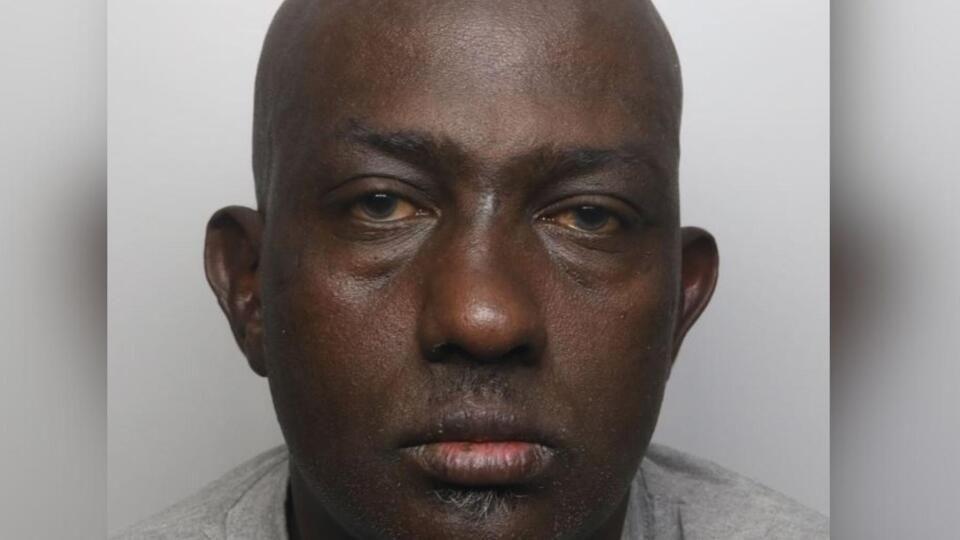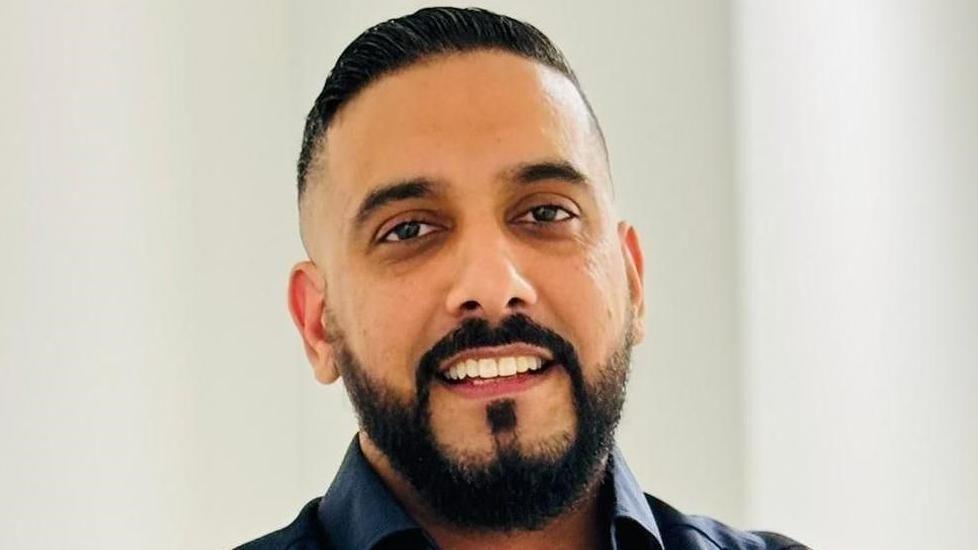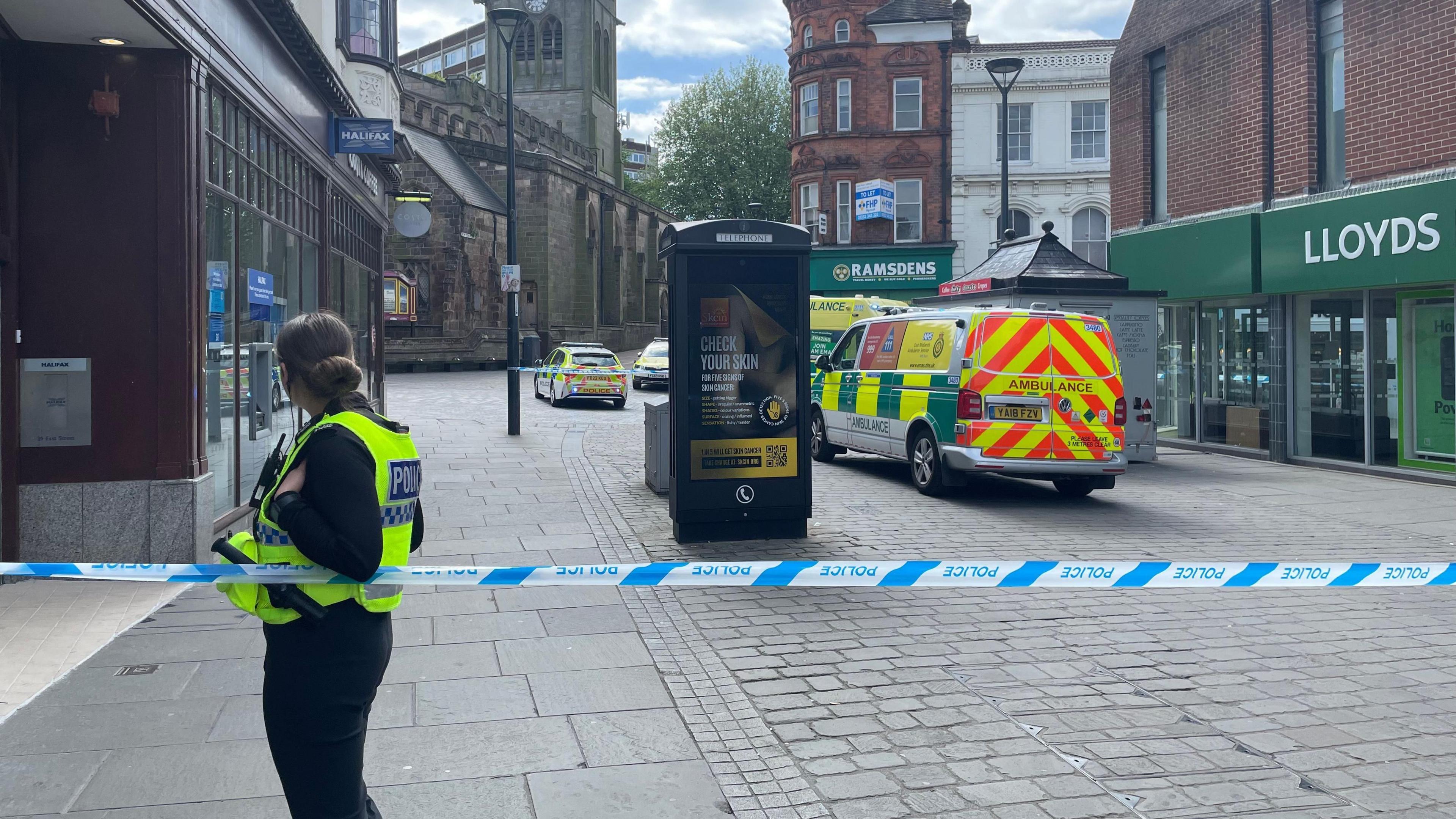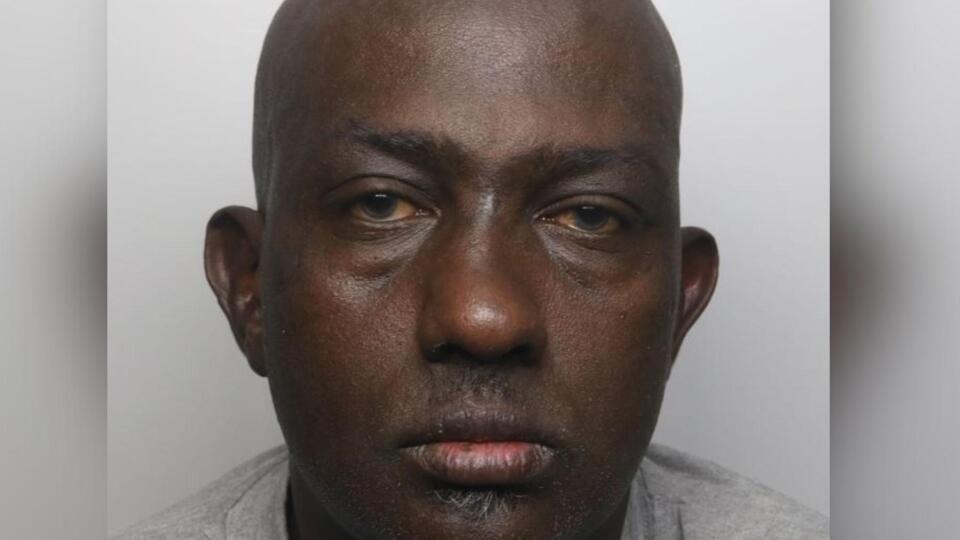Calls for action over asylum seeker bank murder

Haybe Cabdiraxmaan Nur has been jailed for life
- Published
Political leaders in Derby have called on the government to learn lessons after an asylum seeker stabbed a stranger to death in a crowded bank.
Haybe Cabdiraxmaan Nur was jailed for life on Wednesday for the murder of Gurvinder Johal, 37, at a branch of Lloyds Bank in Derby on 6 May.
Judge Shaun Smith said CCTV footage of the "brutal and callous" killing was a "real-life horror film".
The court heard the 47-year-old arrived in the UK on a small boat in October 2024 and had a previous conviction for robbery in Italy as well as police records in other European Union countries.
Derbyshire's police and crime commissioner, Nicolle Ndiweni-Roberts, has written to the home secretary asking for improvements to the way information is shared.
"We now know that that Nur had committed a number of offences, including robbery, assault and resisting a public official, in four European countries before he arrived in the UK," she said.
"I want to make it clear that this information was not known to Derbyshire Constabulary.
"I am also working with colleagues including our council leaders, local MPs and other partners, to call upon the government to ensure that lessons are learned from this tragedy."

Gurvinder Johal's family described him as their "light" in a statement read to the court
But Derbyshire Police is also under scrutiny over its own response to concerns about Nur's mental state, which were raised on the day of the fatal stabbing.
The Independent Office for Police Conduct (IOPC) has investigated a voluntary referral from the force and will publish its findings after any inquest.
The court heard Nur had been drinking heavily and made several agitated calls to a support helpline in the hours before he murdered Mr Johal.
Nur said he was frustrated that he was not allowed to work while his asylum appeal was under way and complained he could not get the mental health support he needed.
In his fourth call to Migrant Help, Nur was crying and "wailing" in distress, and threatened to end his life by walking into moving traffic.
The court heard he then said he would kill 500 people before killing himself, because he was being denied his rights and felt as though he was being kept "in an open door prison".
That prompted the helpline to call East Midlands Ambulance Service (EMAS) at 13:31 BST, which then contacted Derbyshire Police at 13:36 to suggest sending an ambulance "due to the risk of suicide".
Nur left his home armed with a knife about half an hour later. By the time the ambulance arrived at his home, Mr Johal was already dead.

A cordon was set up in Derby after the stabbing
EMAS says it will fully support the IOPC investigation and any coronial process which follows.
It says the call from Migrant Help at 13:31 was reported as a medical emergency.
"Based on the information given in the call, it was correctly triaged as requiring a [lower] category 3 response, and EMAS requested Derbyshire Constabulary attend due to fears the patient would harm themself and others," a spokesperson said.
"At 14:19, due to the time elapsed since the call, it upgraded to requiring a category 2 response.
"We sent a crewed ambulance, arriving on scene at 14:53, 34 minutes after it was escalated to a category 2.
"We treated one patient on scene and did not convey anyone to hospital, with no awareness that the patient had just arrived home following the murder of Gurvinder Johal.
"Our thoughts are with the family of Mr Johal."
Concerns about the management of asylum seekers have also been raised by the East Midlands Strategic Migration Partnership, which includes local authorities and support groups.
Its recommendations were included in a report from Parliament's Home Affairs Committee that was published on Monday.
The partnership believes safeguarding concerns are not communicated effectively, and data needs to be shared in a "more timely and accurate" way, between the Home Office, local authorities and other stakeholders.
"Improvements can be made around the sharing of information about any risk factors or criminal history related to a service user," it added.
The BBC asked the Home Office when it became aware of Nur's criminal record overseas, and whether it is conducting any investigation of its own.
We are awaiting an official response to those questions, but a statement has been released from Alex Norris, the minister for border security and asylum.
He said: "Our thoughts remain very firmly with the loved ones of Gurvinder Johal, after his horrific murder.
"This was a terrifying and shocking incident, which we will not tolerate. Any foreign national who commits a heinous crime on the streets of Britain will face justice and then be subject to removal from our country."
Get in touch
Tell us which stories we should cover in Derby
Follow BBC Derby on Facebook, external, on X, external, or on Instagram, external. Send your story ideas to eastmidsnews@bbc.co.uk, external or via WhatsApp, external on 0808 100 2210.
Related topics
- Published29 October
